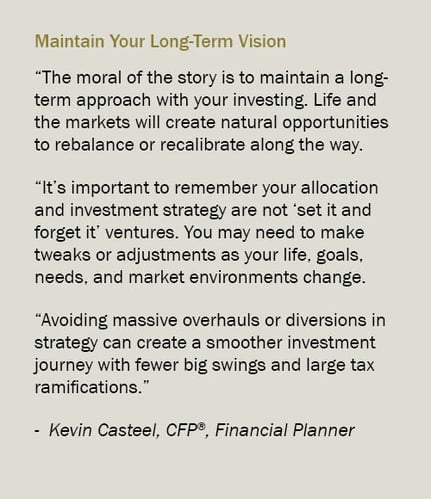4 min read
How to Maintain a Long-term Approach to Investing
 Kevin Casteel, CFP® Trust Officer, Financial Planner
:
Feb 22, 2023 11:00:00 AM
Kevin Casteel, CFP® Trust Officer, Financial Planner
:
Feb 22, 2023 11:00:00 AM

Regardless of how long you have been investing, the volatility in the market last year was enough to make anyone’s stomach churn. Frequently nervous investors were faced with the temptation to pull their money out of the stock market instead of staying disciplined and invested. On impulse, many abandoned the market — putting their long-term goals on the back burner — for cash positions.
But there were countless others who did not give up on the market — investors who chose to stay the course and stick to their financial plan and investment goals. What kept these investors disciplined and invested? What stopped them from making panic decisions about the future of their money?
Perhaps reasoning or past experience gained the upper hand when they realized how staggering the cumulative effect of missing out on just a handful of days in the market could be — leaving necessary growth and income on the table. Or maybe these individuals knew they did not have to ride the market’s rollercoaster alone, choosing instead to partner with family members and their professional advisory teams to help them work through difficult financial decisions — ones based on important conversations pertaining to their long-term investment goals rather than impulsive moves they might regret later.
Considerations for a smoother investment journey
Experience has taught us having a financial plan usually makes for a smoother investment journey in the long run. Ideally, you should review your long-term goals each year to make sure you are still on track with lifestyle changes, your retirement, and wealth management and transfer plans. Not sure where to begin the process? You may find considering the following questions to be helpful.
Do you need to tweak your investment goals?
Take a quick inventory of the types of stocks in your portfolio. There’s a good possibility you may need to adjust your financial goals and your portfolio mix — especially if you have been in the camp with millions of other investors who have enjoyed favorable portfolio performance thanks to juggernaut growth stocks that dominated the S&P Index for years.
In our current economic environment, it might be time to consider adding value stocks to your overall investment mix. Value investments tend to outperform growth stocks during periods of market volatility or as economic growth weakens, typically because of the inherent lower risk profile of companies in this category.
Learn more about growth vs. value investing in our article, ‘Growth’ or ‘Value’: Which Style is Best for Your Portfolio?
Next, think about why you chose your investment goals in the first place:

-
Are you saving for a comfortable lifestyle in retirement?
-
Would you like to buy or build a vacation home?
-
Do you plan on traveling extensively or moving to a different location?
-
Is starting a small business after you retire one of your dreams?
-
Are you investing in your children’s or grandchildren’s educations?
-
Have you earmarked funds for favorite charities or philanthropic interests?
-
Do you want to provide a lasting financial legacy for future generations?
Perhaps the most important question to ask yourself regarding your long-term goals is this: “With all that has happened during the past few years, has my outlook on life changed what I want to do with my money?”
Has your time horizon changed?
-
Generally, investors base their time horizon on when they think they will need to access the money they have invested or saved (e.g., years until retirement). Perhaps in the past year you have decided to work longer than you initially expected – or quite the opposite, taking retirement much sooner than planned.
-
Whatever the case may be, consider the following in your decision-making process:
-
The timing for contributions to, and withdrawals from, your investments.
-
The balance between income and growth securities, in light of after-tax investments.
-
The necessity to dip into retirement accounts before required minimum distributions (RMDs) begin.
-
The flexibility to manage education, health savings, and other specialty accounts according to timing needs.
Do you need to adjust your risk tolerance?
Risk tolerance is one of the most important considerations in managing your portfolio. As a general rule of thumb, younger investors tend to have higher risk tolerances than pre-retiree and retired investors, primarily because they have more working years ahead to make, save, and invest their money. Older investors, on the other hand, do not have the luxury of time on their side to recoup their losses from extended market downturns.
However, regardless of age, there are steps all investors may want to consider pertaining to risk tolerance in order to stay on track with investment goals:
-
Assess how you feel about the level of risk in your portfolio, including how you react or cope with periods of market volatility.
-
Consider market risk and outside risk, including non-liquid assets, real estate, closely held assets, line of work, etc.
-
Think about risks outside of your investments that you hope to avoid (i.e., liquidity, medical emergencies, long-term care, etc.).
-
Consider other sources of income available to you in your working and/or retirement years.
-
Anticipate what you can expect in terms of taxes on income (depending on life stage, career, investments) and ways to minimize your tax bill (corporate vs. municipal bonds, growth vs. value stocks, pre-tax vs. Roth IRAs vs. after-tax contributions).
Next steps
While it may be tempting, do not make any rash decisions to adjust your investment goals or change your portfolio without thoroughly weighing the pros and cons of doing so with your spouse, partner, or trusted family member. Have an open and honest discussion about what you want to change and why.
If you decide to adjust your goals or portfolio mix, we cannot over-emphasize the importance of working with a Financial Planner, Portfolio Manager, Wealth Consultant, or Private Client Advisor when making these important changes. Our financial professionals are experienced in helping clients adjust their investment goals, diversify their portfolios, and reduce their exposure to volatile asset classes and tax ramifications.
Contact Commerce Trust today. Discover firsthand how our team can offer guidance to help you maintain a long-term approach to investing.
Certified Financial Planner Board of Standards, Inc. (CFP Board) owns the certification marks CFP® and CERTIFIED FINANCIAL PLANNER™ in the United States, which it authorizes use of by individuals who successfully complete CFP Board’s initial and ongoing certification requirements.
The opinions and other information in the commentary are provided as of February 22, 2023. This summary is intended to provide general information only, and may be of value to the reader and audience.
This material is not a recommendation of any particular investment or insurance strategy, is not based on any particular financial situation or need, and is not intended to replace the advice of a qualified tax advisor or investment professional. While Commerce may provide information or express opinions from time to time, such information or opinions are subject to change, are not offered as professional tax, insurance or legal advice, and may not be relied on as such. Consult a tax specialist regarding tax implications related to any product and specific financial situation.
Past performance is no guarantee of future results. Diversification does not guarantee a profit or protect against all risk.
Commerce Trust is not Municipal Advisor and does not provide advice to municipal entities or obligated persons relating to the issuance, investment or solicitation of municipal financial products. Commerce Trust does not provide advice relating to rolling over retirement accounts.
Data contained herein from third-party providers is obtained from what are considered reliable sources. However, its accuracy, completeness or reliability cannot be guaranteed.
Commerce Trust does not provide advice related to rolling over retirement accounts.
Commerce Trust is a division of Commerce Bank.
Investment Products: Not FDIC Insured / May Lose Value / No Bank Guarantee
